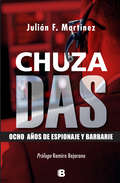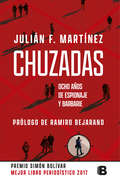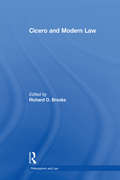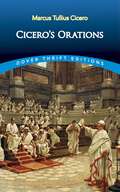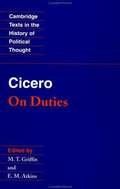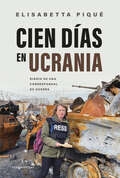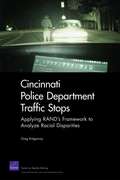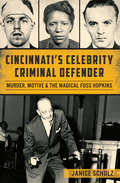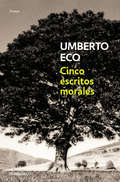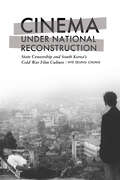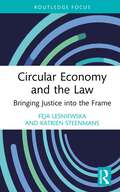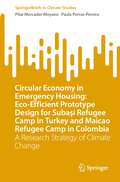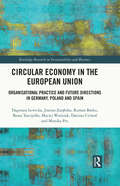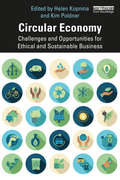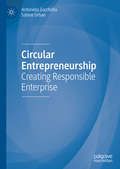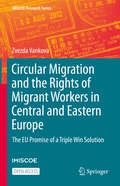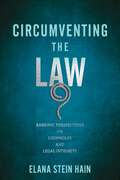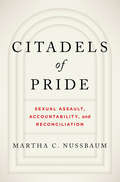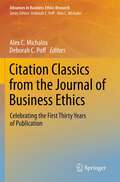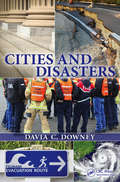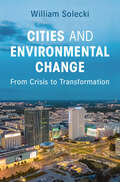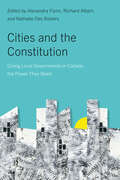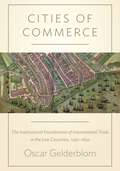- Table View
- List View
ChuzaDAS
by Julián Fernando Martínez VallejoLa historia detrás de las chuzadas del DAS. Aunque el tema es parcialmente conocido, el reportero Julián F. Martínez en esta impresionante investigación, logra poner en contexto -además de adicionar datos aún desconocidos y una rigurosa documentación-, uno de los periodos más oscuros de la historia política del país. Más allá de lo que se llamaron las #chuzaDas#, este libro aborda otros hechos graves como espionaje, amenazas, persecución y asesinatos.
Chuzadas: Ocho años de espionaje y barbarie
by Julian F. MartínezLa historia detrás de las chuzadas del DAS. Aunque el tema es parcialmente conocido, el reportero Julián F. Martínez en esta impresionante investigación, logra poner en contexto -además de adicionar datos aún desconocidos y una rigurosa documentación-, uno de los periodos más oscuros de la historia política del país. Más allá de lo que se llamaron las chuzaDas, este libro aborda otros hechos graves como espionaje, amenazas, persecución y asesinatos. «ChuzaDAS es un documento que hace parte de la memoria histórica de uno de los peores episodios de los servicios de inteligencia de Colombia. Es un texto de consulta en donde cada una de las aseveraciones está comprobada con fechas, documentos de soporte y datos de contexto. Este libro es uno de los mejores trabajos de Julián F. Martínez, ya que gracias a su exhaustiva investigación demuestra que por órdenes del gobierno de turno se interceptaron diferentes periodistas, magistrados, jueces y miembros de la oposición política del momento. ChuzaDAS es y será, sin duda, un libro de referencia en elque se estudia cómo la manera de gobernar nunca debería deformarse o desvirtuarse para convertirse en persecución y espionaje». Yohir Akerman
Cicero and Modern Law (Philosophers And Law Ser.)
by Richard O. BrooksCicero and Modern Law contains the best modern writings on Cicero's major law related works, such as the Republic, On Law, On Oratory, along with a comprehensive bibliography of writings on Cicero's legal works. These works are organized to reveal the influence of Cicero's writings upon the history of legal thought, including St. Thomas, the Renaissance, Montesquieu and the U.S. Founding Fathers. Finally, the articles include discussions of Cicero's influence upon central themes in modern lega thought, including legal skepticism, republicanism, mixed government, private property, natural law, conservatism and rhetoric. The editor offers an extensive introduction, placing these articles in the context of an overall view of Cicero's contribution to modern legal thinking.
Cicero's Orations: In Catilinam I-iv, Pro Caelio, Pro Milone, Pro Archia (Dover Thrift Editions)
by Marcus Tullius Cicero Charles Duke YongeThe greatest orator of the late Roman Republic, Marcus Tullius Cicero (106–43 B.C.), influenced the course of European letters for centuries after his death. Through his writings, Renaissance and Enlightenment scholars encountered the riches of Classical rhetoric and philosophy. The elegance of his style, his skill and erudition, his worldly wisdom, and his profound humanity made Cicero a model for latter-day thinkers and keep his works ever relevant. This collection presents examples of rhetoric from throughout the ancient Roman's illustrious career. Selections include a series of famous speeches delivered during Cicero's term as consul which thwarted the Catiline conspiracy to overthrow the Republic — but led to his own prosecution and exile. The compilation concludes with the bold orations delivered in defiance of Marc Anthony, which sealed Cicero's doom.
Cicero: On Duties
by Marcus Tullius CiceroDe Officiis (On Duties) was Cicero's last philosophical work. In it he made use of Greek thought to formulate the political and ethical values of Roman Republican society as he saw them, revealing incidentally a great deal about actual practice. Writing at a time of political crisis after the assassination of Julius Caesar in 44BC, when it was not clear how much of the old Republican order would survive, Cicero here handed on the insights of an elder statesman, adept at political theory and practice, to his son, and through him, to the younger generation in general. De Officiis has often been treated merely as a key to the lost Greek works that Cicero used. This volume aims to render De Officiis, which was such an important influence on later masterpieces of Western political thought, more intelligible by explaining its relation to its own time and place. A wholly new translation is accompanied by a lucid introduction and all the standard features of Cambridge Texts in the History of Political Thought, including a chronology, select bibliography, and notes on the vocabulary and significant individuals mentioned in the text.
Cicero: On Moral Ends
by Julia AnnasThis 2001 translation makes one of the most important texts in ancient philosophy available to modern readers. Cicero is increasingly being appreciated as an intelligent and well-educated amateur philosopher, and in this work he presents the major ethical theories of his time in a way designed to get the reader philosophically engaged in the important debates. Raphael Woolf's translation does justice to Cicero's argumentative vigour as well as to the philosophical ideas involved, while Julia Annas's introduction and notes provide a clear and accessible explanation of the philosophical context of the work. This edition will appeal to all readers interested in this central text in ancient philosophy and the history of ethics.
Cicero’s De Finibus
by Julia Annas Gábor BeteghCicero is increasingly recognised as a highly intelligent contributor to the ongoing ethical debates between Epicureans, Stoics and other schools. In this work on the fundamentals of ethics his learning as a scholar, his skill as a lawyer and his own passion for the truth result in a work which dazzles us in its presentation of the debates and at the same time exhibits the detachment of the ancient sceptic. Many kinds of reader will find themselves engaged with Cicero as well as with the ethical theories he presents. This collection takes the reader further into the debates, opening up new avenues for exploring this fascinating work.
Cien días en Ucrania: Diario de una corresponsal de guerra
by Elisabetta PiquéGestado sobre el terreno en medio de sirenas y explosiones, el libro desnuda las historias de desasosiego de la gente común detrás de una guerra que marcará un antes y un después en los equilibrios geopolíticos del mundo. El colega italiano me pregunta si quiero sumarme a una lista de personas a evacuar que está preparando el consulado de Italia.Le agradezco, pero no. No tengo ninguna duda de que voy a quedarme en Kiev. acabo de llegar y quiero contar esta historia. Elisabetta Piqué fue la primera periodista en llegar al lugar exacto donde comenzaron a llover las bombas y los misiles que iniciaron la invasión rusa a Ucrania. Durante los cien días que totalizaron sus tres estadías en la zona de conflicto, además de informar como corresponsal de La Nación, se dedicó a documentar su experiencia cotidiana y a recoger las voces de víctimas y testigos anónimos. Gestado en terreno, en medio de sirenas y explosiones, este libro desnuda las historias de desasosiego de la gente común detrás de la guerra que está marcando un antes y un después en los equilibrios geopolíticos del mundo y, al mismo tiempo, permite asomar a la experiencia personal y sensible de una periodista en el peligroso frente de batalla. Testimonio de primera mano tan crudo y original como reflexivo y bien narrado, Cien días en Ucrania pone al descubierto los aspectos más tangibles y concretos de la vida en medio de una guerra distinta que se libra en el corazón de Europa y en las redes sociales, involucra a todo el planeta y no tiene fin a la vista.
Cincinnati Police Department Traffic Stops
by Greg RidgewayIn 2002, the Cincinnati Police Department (CPD) joined with other agencies and organizations to improve police-community relations in the city. This report focuses on the analysis of racial disparities in traffic stops in Cincinnati. The authors find no evidence of racial differences between the stops of black and those of similarly situated nonblack drivers, but some issues can exacerbate the perception of racial bias.
Cincinnati's Celebrity Criminal Defender: Murder, Motive & the Magical Foss Hopkins
by Janice SchulzMurder, deceit, and thrilling courtroom drama in this chronicle of Ohio&’s infamous criminal defense attorney, Foss Hopkins. With half a century in the courtroom, criminal defense attorney William &“Foss&” Hopkins represented more than 550 clients. Known to be charismatic and brilliant, Foss&’s dedication to defending the falsely accused often landed him in controversy. He specialized murder cases, and took on had more than a few colorful defendants . . . William Kuhlman and his gang left a trail of blood from Indiana to Kentucky after hacking up the body of Cincinnati fireman &“Cap&” Miller. Attractive and naïve Louise Sharpe pumped three bullets into her lover and left him dying on the floor of his Walnut Hills apartment. After Marie Abbott&’s farmhand lover killed her husband, Marie helped him stage the murder as an accident . . . These are just some of the people whose trials made Foss Hopkins Cincinnati&’s Celebrity Criminal Defender. In this captivating book you&’ll learn about the man himself, some of his most astounding victories, and the crushing defeats that ended in the electric chair.
Cinco escritos morales
by Umberto EcoPor qué la guerra ha pasado a ser hoy día inviable; las características y vigencia del fascismo; los cambios de la prensa ante la presencia de la televisión; los fundamentos y la posibilidad de una ética laica, y la tolerancia e intolerancia ante la migración que hará de Europa en los próximos años un continente multirracial.
Cinema under National Reconstruction: State Censorship and South Korea’s Cold War Film Culture
by Hye Seung ChungCinema under National Reconstruction calls for a revisionist understanding of state film censorship during successive Cold War military regimes in South Korea (1961–1988). Drawing upon primary documents from the Korean Film Archive’s digitized database and framing South Korean film censorship from a transnational perspective, Hye Seung Chung makes the case that, while political oppression/repression existed inside and outside the film industry during this period, film censorship was not simply a tool for authoritarian dictatorship. Through such case studies as Yu Hyun-mok’s The Stray Bullet (1961), Ha Kil-jong’s The March of the Fools (1975), and Yi Chang-ho’s Declaration of Fools (1983), the author defines censorship as a dialogical process of cultural negotiations wherein the state, the film industry, and the public fight out a battle over the definitions and functions of national cinema. In the context of Cold War Korea, one cannot fully understand or construct film history without reassessing censorship as a productive feedback system where both state regulators and filmmakers played active roles in shaping the new narrative or sentiment of the nation on the big screen.
Circular Economy and the Law: Bringing Justice into the Frame (Routledge Focus on Environment and Sustainability)
by Feja Lesniewska Katrien SteenmansThis book explores the role of law and policy in circular economy transitions and their impacts on justice, including on distributional equity and recognition and procedural rights, especially for people already marginalised under the current dominant economic system. Amid increasing demand for virgin raw materials, and unsustainable consumption and waste disposal that are driving the global ecological and climate crisis, there are growing calls to urgently transition to circular economies. Despite an increasing number of circular approaches being adopted, implemented, and integrated in national and local laws and policies, the number of commercially successful business stories remains isolated. Moreover, questions about whether circular economy laws and policies are delivering fair and just global outcomes need to be addressed. This book examines this significant knowledge gap to understand legal experiences, including justice and equity issues in the global context, so that these can inform wider design and implementation. The book begins by explaining the concept of a circular economy and its context within wider issues of sustainable development and justice. The first part of the book then examines the legal context of the circular economy by analysing legal forms in practice and those recommended in wider scholarship before considering how these could impact on existing inequity and injustices globally. The second part delivers an empirical understanding of the implications of the law on circular economy approaches and the global equity and justice dimensions through two case studies on solid waste management and forestry. The final part addresses legal opportunities and challenges for wider implementation of circular economy approaches that incorporate justice into its framing. This book will be of great interest to students, scholars, and practitioners of environmental and natural resource law and policy, circular economy, industrial ecology, natural resource management, and sustainable development more broadly.
Circular Economy in Emergency Housing: A Research Strategy of Climate Change (SpringerBriefs in Climate Studies)
by Pilar Mercader-Moyano Paula Porras-PereiraIn recent years, there has been an upsurge in the number of forced displacements due to natural disasters, armed conflicts, and pandemics, which has favoured an increase in the number of temporary accommodations. Although the provision of shelter after an emergency situation is one of the priorities of humanitarian aid, the reality is that the conditions in which people live in a situation of forced displacement are absolutely precarious and overcrowded. Nowadays, this type of housing tends to have a short lifespan, deepening the environmental impact and the generation of waste. Likewise, added to this great problem is the linear economic system implemented worldwide, which also causes a high rate of waste.This investigation develops an eco-efficient design protocol that determines the basic premises in any emergency situation, therefore avoiding the precarious nature to which those in forced displacement are exposed. Moreover, the research investigates different constructive solutions that can respond to situations of natural catastrophes or humanitarian disasters where emergency housing is needed as well as the possible alternatives from the point of view of circular economy. Eco-efficient and environmentally correct solutions are sought, which can be adaptable to the different scenarios where emergency housing may be needed, thus creating a rapid, easy, functional, and environmentally correct architecture, adaptable to these types of situations. The study shows that the factors that characterize emergency architecture can be an example of where the issues around the sustainability factor are applied in a practical way. The main objectives of this study are to develop an eco-efficient design protocol which determines the basic premises in any emergency situation and to find eco-efficient and environmentally correct solutions, adaptable to different scenarios, which have similar climatic characteristics, and where emergency housing may be needed, thus creating a type of ephemeral architecture but sensitive to the user to whom it is intended and in accordance with the optimal conditions of habitability.
Circular Economy in the European Union: Organisational Practice and Future Directions in Germany, Poland and Spain (Routledge Research in Sustainability and Business)
by Dagmara Lewicka Joanna Zarębska Roman Batko Beata Tarczydło Maciej Wożniak Dariusz Cichoń Monika PecCircular Economy in the European Union: Organisational Practice and Future Directions in Germany, Poland and Spain presents the EU's journey towards a Circular Economy (CE), identifying significant organizational practices in this gradually adopted field among member countries. The book also aims to develop and propose innovative initiatives and practices for implementing CE across various economic sectors in selected EU countries, such as Poland, Spain and Germany. Covering topics which include the implementation of CE in the EU and worldwide, green employee behaviors, corporate social responsibility in creating pro-environmental attitudes and models of eco-digital factory transformation in SMEs, the book emphasizes the importance of innovative, environmentally friendly, low-waste, and low-emission technologies. Consisting of thirteen interconnected chapters, it discusses the challenges and opportunities of CE, the importance of business engagement in addressing social and environmental problems, and provides practical examples of innovative solutions in various sectors. This volume will be of great interest to students and scholars of circular economy, corporate governance, business ethics and sustainable business, as well as entrepreneurs, managers, government representatives, and non-governmental organizations active in CE.
Circular Economy: Challenges and Opportunities for Ethical and Sustainable Business
by Helen Kopnina; Kim PoldnerHow can we design circular business models? How can we organize the transition from a linear to a circular economy? And how can we imagine circular futures that help us transform current realities? This book aims to provide answers to these questions while addressing the challenges and opportunities of the circular economy. The authors reflect on why conventional sustainability models – such as the ‘triple P’ (People, Profit and Planet) or eco-efficiency – have failed in addressing environmental challenges, including climate change, biodiversity loss and pollution. They then move on to explore innovative circular business models, which propose to eliminate environmental damage by radically reforming the system of industrial production. Organizing the transition is a collaborative effort: entrepreneurs, consumers, policymakers, multinationals and intermediaries need to work together to foster the emergence of the circular economy as an institutional field. Together with younger generations of learners and equipped with beyond-human-centred values towards awareness of the material and natural world, novel circular futures can be imagined. Offering points of reference for continued critical discourse and examples of practically applicable sustainability solutions, this book will be of great interest to students, teachers, practitioners and scholars of circular economy.
Circular Entrepreneurship: Creating Responsible Enterprise
by Antonella Zucchella Sabine UrbanThis original book explores how the principles of circularity, considered a law of nature but neglected within the materialistic orientation of the industrial age, are becoming attractive again in business and society. Investigation reveals enterprises small and large delivering a stimulating message, from changes in entrepreneurial mindsets to the inclusive use of new technologies and a push for innovation. Zucchella and Urban explore the novel concept of circular enterprise, showing how, with their capacity to innovate, these firms are becoming the most powerful actors of a new, sustainable social order. They examine two fundamental questions: why is this revolution occurring now, and how is it being implemented? Focusing on the most innovative practices, they demonstrate the potential of circular enterprise for industry and wider society, making clear that a new world is emerging.
Circular Migration and the Rights of Migrant Workers in Central and Eastern Europe: The EU Promise of a Triple Win Solution (IMISCOE Research Series)
by Zvezda VankovaBy adopting a rights-based approach, this open access book sheds light on the different legal and policy instruments that have been adopted to implement circular migration policies in the EU and their consequences for the rights of migrant workers. It contributes to the understanding of the meaning of this concept in general, in the EU, as well as more specifically with regard to its Eastern neighbourhood. The book provides a comprehensive overview of the formation and implementation of the EU’s circular migration approach that has developed through both EU and national instruments on the basis of comparative case study analysis of Bulgaria and Poland’s migration law and policy. Furthermore, by applying legal empirical research methods, it draws conclusions about the policy outcomes from the implementation of the various migration instruments falling under the circular migration umbrella and shows the consequences for the rights of migrant workers as a result of the application of different policy options.Along with its value to an academic audience, the book can be used by policy makers at the EU, international and national level as well as international organisations and NGOs working in the field of migration law and policy.
Circumventing the Law: Rabbinic Perspectives on Loopholes and Legal Integrity (Jewish Culture and Contexts)
by Elana Stein HainCircumventing the Law probes the rabbinic logic behind the use of loopholes, the legal phenomenon of finding and using gaps within law to achieve otherwise illegal outcomes. The logic of ha’aramah, a subset of rabbinic legal circumventions mostly defined as a tool for private life, underpins both well-known circumventions, such as selling leaven before Passover, and lesser-known mechanisms, such as designating an animal intended for sacrifice “blemished” before birth to allow it to be slaughtered for food instead. Elana Stein Hain traces the development of these loopholes over time, revealing that rabbinic literature does not consistently accept or reject loopholes. Instead, rabbinic Judaism applies categories of evasion (prohibited), avoidance (permitted), and avoision (contested) to loopholes on a case-by-case basis. The intended outcome of a given loophole determines its classification, as does the legal integrity of the circumventive process in question.Yet these understandings of loopholes are not static—instead, rabbinic attitudes toward loopholing change over time. Early works display an objective, performative understanding of the self and of intention, but evolve over time to reflect more subjective and intimate understanding of the self and intention. This evolution redefines what legal integrity means in Jewish legal philosophy.Circumventing the Law brings readers through the Second Temple period to the modern era to see how loopholing has evolved over millennia. With a focus on late antiquity, Stein Hain explores tannaitic literature, the Palestinian Talmud, and contemporaneous Greco-Roman and Persian thought to show that when warranted, Jewish rhetoric and philosophy around understandings of loopholes was a unique phenomenon that relied on changes in understanding the definition of integrity itself, a key finding for scholars of Jewish Studies and of religious and of secular law writ large.
Citadels of Pride: Sexual Abuse, Accountability, And Reconciliation
by Martha C. NussbaumA groundbreaking exploration of sexual violence by one of our most celebrated experts in law and philosophy. In this essential philosophical and practical reckoning, Martha C. Nussbaum, renowned for her eloquence and clarity of moral vision, shows how sexual abuse and harassment derive from using people as things to one’s own benefit—like other forms of exploitation, they are rooted in the ugly emotion of pride. She exposes three “Citadels of Pride” and the men who hoard power at the apex of each. In the judiciary, the arts, and sports, Nussbaum analyzes how pride perpetuates systemic sexual abuse, narcissism, and toxic masculinity. The courage of many has brought about some reforms, but justice is still elusive—warped sometimes by money, power, or inertia; sometimes by a collective desire for revenge. By analyzing the effects of law and public policy on our ever-evolving definitions of sexual violence, Nussbaum clarifies how gaps in U.S. law allow this violence to proliferate; why criminal laws dealing with sexual assault and Title VII, the federal law that is the basis for sexual harassment doctrine, need to be complemented by an understanding of the distorted emotions that breed abuse; and why anger and vengeance rarely achieve lasting change. Citadels of Pride offers a damning indictment of the culture of male power that insulates high-profile abusers from accountability. Yet Nussbaum offers a hopeful way forward, envisioning a future in which, as survivors mobilize to tell their stories and institutions pursue fair and nuanced reform, we might fully recognize the equal dignity of all people.
Citation Classics from the Journal of Business Ethics: Celebrating the First Thirty Years of Publication (Advances in Business Ethics Research #2)
by Alex C. Michalos Deborah C PoffThe Journal of Business Ethics was founded by Alex C. Michalos and Deborah C. Poff and published its first issue in March 1982. It is the most frequently cited business ethics journal in the world. The Journal has always offered a multi-disciplinary and international public forum for the discussion of issues concerning the interaction of successful business and moral virtue. Its authors and readers are primarily scholars and students in social sciences and philosophy , with special interests in the interaction of these disciplines with business or corporate responsibility. Since the field of business ethics grew simultaneously with the growth of the Journal, a collection of its most cited articles is tantamount to a collection of the articles that had the greatest influence in defining the field over its first 30 years of development. In this anniversary volume, an overview of citation classics from the Journal is presented, the 33 most frequently cited articles are reproduced and brief reflections on the impact of the Journal on the field are given from over 100 scholars who authored citation classics and/or distinguished papers, as well as those who served on the Editorial Board and/or are recognized as leaders in the field.
Cities and Disasters
by Davia C. DowneyCities and Disasters presents interdisciplinary and multinational perspectives on emergency management policy, economic development, and the various factors that affect the recovery process after natural disasters strike urban areas. The book has three central themes: policy, urbanity, and the interplay of events after disasters that affect the pro
Cities and Environmental Change: From Crisis to Transformation
by William SoleckiEnvironmental issues have always burdened cities and their residents. This volume analyses how cities have solved past environmental challenges to provide a framework on which to build solutions to the problems caused by the climate crisis. It sets urban environmental crises within the socio-technical history of urban development. With six application chapters that provide rich and detailed examples of urban environmental transitions - including water resources, air quality, and public health - this book promotes better understanding of how urban environmental change takes place across a wide array of social-ecological-technological systems. It illustrates the process of urban environmental transition and the role crises play in shifts in urban environmental policy. Readers of the book will gain a deeper understanding of urban climate action and activities for future action. It is invaluable reading for students, researchers, and policymakers in environmental sustainability, climate change, urban studies and planning, and public policy.
Cities and the Constitution: Giving Local Governments in Canada the Power They Need (McGill-Queen's Studies in Urban Governance #18)
by Alexandra Flynn, Richard Albert and Nathalie Des RosiersCanada’s largest cities have faced exponential growth, with the trajectory rising further still. Due to their high density, cities are the primary sites for opportunities in economic prosperity, green innovation, and cultural activity, and also for critical challenges in homelessness and extreme poverty, air pollution, Indigenous-municipal relationship-building, racial injustice, and transportation gridlock. While city governments are at the forefront of mitigating the challenges of urban life, they are given insufficient power to effectively attend to public needs.Cities and the Constitution confronts the misalignment between the importance of municipalities and their constitutional status. While our constitution is often considered a living document, Canada has one of the most complicated amending formulas in the world, making change very difficult. Cities are thus constitutionally vulnerable to unilateral provincial action and reliant on other levels of government for funding. Could municipal power be reimagined without disrupting the existing constitutional structure, or could the Constitution be reformed to designate cities a distinct tier of government? Among other novel proposals, this groundbreaking volume explores the idea of recognizing municipalities in provincial constitutions.The first volume of a complementary pair, authored by renowned Canadian legal and urban studies scholars, Cities and the Constitution suggests contemporary solutions to one of our most pressing policy dilemmas.
Cities of Commerce: The Institutional Foundations of International Trade in the Low Countries, 1250-1650 (The Princeton Economic History of the Western World #45)
by Oscar GelderblomCities of Commerce develops a model of institutional change in European commerce based on urban rivalry. Cities continuously competed with each other by adapting commercial, legal, and financial institutions to the evolving needs of merchants. Oscar Gelderblom traces the successive rise of Bruges, Antwerp, and Amsterdam to commercial primacy between 1250 and 1650, showing how dominant cities feared being displaced by challengers while lesser cities sought to keep up by cultivating policies favorable to trade. He argues that it was this competitive urban network that promoted open-access institutions in the Low Countries, and emphasizes the central role played by the urban power holders--the magistrates--in fostering these inclusive institutional arrangements. Gelderblom describes how the city fathers resisted the predatory or reckless actions of their territorial rulers, and how their nonrestrictive approach to commercial life succeeded in attracting merchants from all over Europe. Cities of Commerce intervenes in an important debate on the growth of trade in Europe before the Industrial Revolution. Challenging influential theories that attribute this commercial expansion to the political strength of merchants, this book demonstrates how urban rivalry fostered the creation of open-access institutions in international trade.
